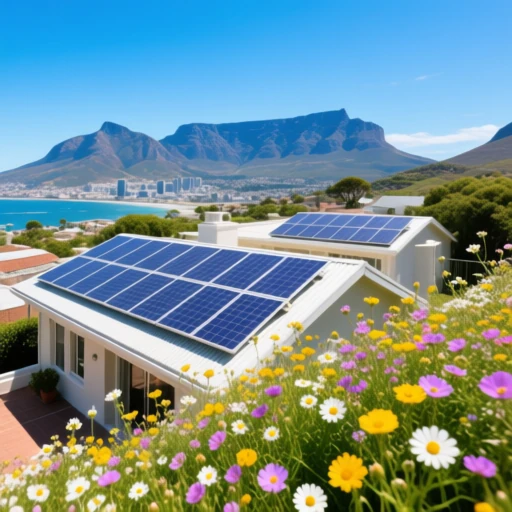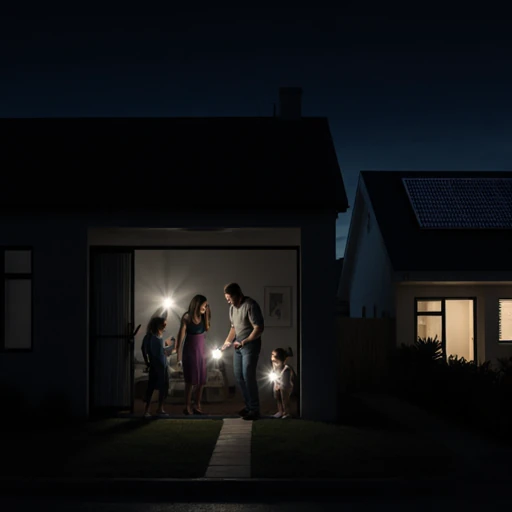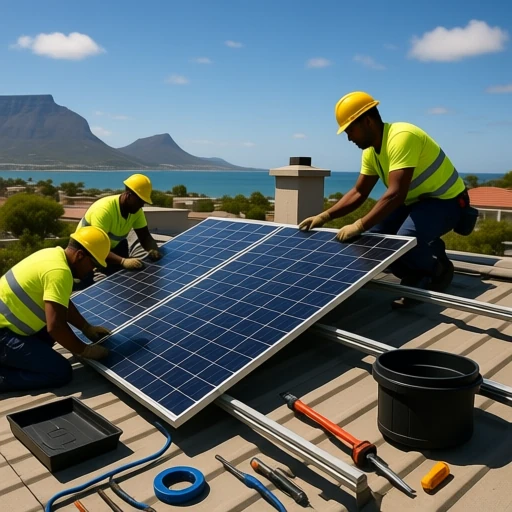As the days lengthen and the chill of winter fades in Cape Town, there’s a buzz in the air that’s not just from the blooming fynbos. It’s the sound of savvy homeowners and business owners gearing up for a smarter energy future. If you’ve ever grumbled through another load shedding blackout or winced at your escalating electricity bill, you’re not alone. But what if I told you that right now, in mid-spring, is the golden window to flip the script? Installing a solar PV system isn’t just a trend, it’s a practical lifeline in our power-pinched city. Let’s dive into why this season stands out, and how it can turn your energy woes into wins.

Load Shedding and Skyrocketing Bills
Picture this: You’re in the middle of a crucial work call, or your family is settling in for movie night, when suddenly, everything goes dark. That’s load shedding for you, a persistent headache for Capetonians. Even though schedules show stability in October 2025 with minimal outages reported across the city, the threat looms large. Eskom’s updates indicate that while the power system is currently stable, historical patterns remind us that disruptions can spike without warning, especially as summer demand ramps up.
Then there’s the sting of high electricity bills. With tariffs climbing steadily due to national energy costs, households and businesses in Cape Town are feeling the pinch. Whether it’s running air conditioners in the coming heat or powering essential appliances, inefficient grid reliance drains wallets. Add in outdated electrical setups that waste energy, and you’ve got a perfect storm of frustration. These aren’t abstract issues, they’re daily realities that disrupt productivity, comfort, and peace of mind for home and business owners alike.
For businesses, it’s even more acute. Imagine a restaurant in the Southern Suburbs losing power during peak hours, or a small office in Plumstead grinding to a halt. Homeowners face similar woes, from spoiled groceries to interrupted remote work. The common thread? Dependence on an unreliable grid that’s vulnerable to national supply issues. This is where a qualified electrician steps in, identifying inefficiencies like faulty wiring or poor load management that exacerbate these problems.
What Happens If You Ignore These Issues?

Brushing off load shedding and high bills might seem tempting in quieter times, but the fallout can be severe. Financially, unchecked electricity costs can balloon your monthly expenses by hundreds or even thousands of rands. Over a year, that adds up to significant losses, money that could go toward family vacations or business expansions. In Cape Town’s competitive market, businesses risk losing customers if outages cause delays or closures, potentially leading to revenue dips of 20-30% during peak disruption periods based on local reports.
Safety is another big concern. Frequent power surges from unstable supply can damage appliances, leading to costly repairs or replacements. Think about your fridge, computer, or industrial equipment, all at risk. Environmentally, sticking with grid power means higher carbon footprints, contributing to broader climate issues that affect our beautiful city. And let’s not forget the stress factor: Constant uncertainty breeds anxiety, turning what should be relaxing evenings into nail-biting waits for the lights to flicker.
If left unaddressed, these problems compound. For instance, during summer’s higher demand, load shedding could intensify, as seen in past years. Businesses might face operational shutdowns, while homes deal with discomfort in the heat without reliable cooling. The ripple effects extend to the economy, with Cape Town’s tourism and tech sectors particularly vulnerable. Ignoring this now means missing out on long-term stability, especially as energy prices are projected to rise further amid national challenges.
The Mid-Spring Advantage for a Solar PV System Installation
So, how do we tackle this head-on? The answer lies in transitioning to a solar PV system, and timing is everything. Mid-spring, particularly October in Cape Town, offers ideal conditions for photovoltaic panels installation. With average highs around 21°C and plenty of sunshine averaging 9 hours daily, the weather is mild and dry, making it perfect for safe, efficient setups without the interruptions of winter rains or summer’s intense heat.
Why spring specifically? Installing now allows your system to be up and running before summer’s peak usage. Solar panels thrive in our abundant sunlight, converting it into clean energy that powers your home or business. A basic solar PV system includes panels, an inverter to turn DC into usable AC power, and batteries for storage, ensuring continuity during outages. This setup not only combats load shedding by providing backup but also slashes bills by offsetting grid consumption.
Start with an energy audit: A professional assesses your usage, recommends the right system size, and ensures compliance with City of Cape Town regulations for small-scale embedded generation. A solar PV system installation involves mounting panels on your roof, ideally at an angle suited to our latitude for maximum capture. In Cape Town, north-facing orientations yield the best results, capturing spring’s strengthening sun rays.
The process is straightforward: Site survey, design, permitting, installation, and commissioning. With minimal rain in October (typically low precipitation), crews can work uninterrupted, often completing residential setups in a few days. Businesses benefit similarly, with scalable systems that integrate seamlessly. Plus, solar panels perform optimally in cooler temperatures, so spring’s mild climate boosts initial efficiency as you head into summer.
Beyond immediate relief, this framework promotes sustainability. Solar PV systems reduce reliance on fossil fuels, lowering your environmental impact. Maintenance is low-key, mostly cleaning and occasional checks, making it a set-it-and-forget-it solution. For those worried about winter dips, spring installation gives time to optimize, ensuring year-round benefits despite cloudier months.

Seamless Integration for Lasting Results
In this solution landscape, partnering with experienced professionals ensures success without the hassle. Qualified electricians handle everything from design to compliance, tailoring solar PV systems to your specific needs. They navigate local bylaws, like Cape Town’s requirements for safe grid-tied installations, avoiding common pitfalls.
Imagine a solar PV system that not only powers your essentials during blackouts but also feeds excess energy back to the grid, potentially earning credits. This subtle alignment with expert services means peace of mind, knowing your photovoltaic panels installation meets safety standards and maximizes ROI. Companies specializing in Cape Town’s unique climate and infrastructure can optimize for wind resistance and optimal sun exposure, enhancing durability.
For businesses, this means uninterrupted operations, from retail shops to offices. Homeowners gain independence, turning their properties into energy-efficient havens. It’s about more than installation, it’s building resilience. With the right team, your solar journey becomes effortless, positioning you ahead of the curve as energy demands evolve.

Diving deeper, let’s consider the tech side. Solar panels, the heart of any PV system, have advanced remarkably. Modern monocrystalline options offer high efficiency, even on partly cloudy days common in our spring. Pair them with smart inverters that monitor performance via apps, and you’ve got real-time insights into savings. In Cape Town, where wind can be a factor, reinforced mounting systems keep everything secure.
Entertainment-wise, think of it as upgrading from an old flip phone to a smartphone: Suddenly, you’re in control. No more scrambling for candles during outages, instead, your lights stay on, courtesy of stored solar power. Businesses can even market their green credentials, attracting eco-conscious customers in our tourism-driven city.
Of course, sizing matters. A typical 5kW system might cover a medium home’s needs, while larger setups suit commercial spaces. Factors like roof space and budget guide choices, but the payoff is clear: Reduced bills by up to 80% in sunny months, per local data. And with South Africa’s sunny disposition, averaging over 2,500 hours annually, Cape Town is primed for solar success.
As we wrap up the framework, remember that mid-spring installation sets you up for immediate gains. The mild weather minimizes delays, and with summer around the corner, you’ll capture peak production right away. It’s a strategic move that pays dividends in reliability and savings.
Frequently Asked Questions
- What makes mid-spring ideal for photovoltaic panels installation in Cape Town?
Mid-spring offers mild, dry weather with ample sunshine, allowing efficient installation without winter rain delays or summer heat discomfort, setting you up for peak summer performance. - How does a solar PV system help with load shedding?
It provides backup power through batteries, keeping essentials running during outages, reducing dependence on the unstable grid. - Can solar panels reduce my electricity bills significantly?
Yes, by generating your own power, you offset grid usage, potentially saving up to 80% on bills during sunny periods, depending on system size and consumption. - What are the key steps in installing a solar PV system?
It starts with an audit, followed by design, permitting from the City of Cape Town, physical installation, and testing for safe operation. - Are there maintenance requirements for solar panels?
Minimal, mainly periodic cleaning to remove dust or bird droppings, and annual checks by a professional to ensure optimal performance.
Mid-spring in Cape Town isn’t just about enjoying the outdoors, it’s your cue to embrace a solar PV system for lasting relief from load shedding and high bills. With the right approach, you’ll not only solve today’s pains but future-proof your energy needs. Ready to make the switch? The sun’s shining on your decision.
Discover causes of electrical distribution board overloads in Cape Town’s spring, spot signs early to avoid outages, and get expert tips – read our recent article here…
